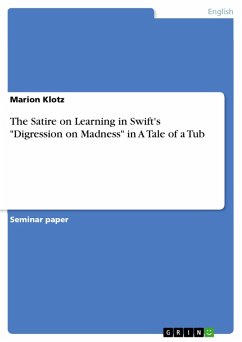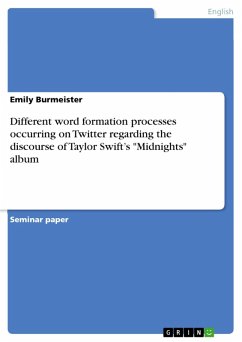
The Satire on Learning in Swift's "Digression on Madness" in A Tale of a Tub (eBook, PDF)

PAYBACK Punkte
0 °P sammeln!
Seminar paper from the year 2004 in the subject English Language and Literature Studies - Literature, grade: 1,7 (A-), Johannes Gutenberg University Mainz (Englies Institute), course: Swift and Satire, language: English, abstract: "Satyr is a sort of Glass, wherein Beholders do generally discover everybody's face but their Own; which is the chief Reason for that kind Reception it meets in the World, and that so few are offended with it" (Swift, see Weiß 1). When Swift wrote this, A Tale of a Tub had not been published yet. If it had been, he might not have characterised satire as something qu...
Seminar paper from the year 2004 in the subject English Language and Literature Studies - Literature, grade: 1,7 (A-), Johannes Gutenberg University Mainz (Englies Institute), course: Swift and Satire, language: English, abstract: "Satyr is a sort of Glass, wherein Beholders do generally discover everybody's face but their Own; which is the chief Reason for that kind Reception it meets in the World, and that so few are offended with it" (Swift, see Weiß 1). When Swift wrote this, A Tale of a Tub had not been published yet. If it had been, he might not have characterised satire as something quite inoffensive to the individual reader: A Tale of a Tub made him the subject of massive criticism, mainly because of its supposed blasphemous nature. Not very surprisingly, however, this criticism was mainly issued by the men he had attacked in the digression, which were not about religion but learning (see Storkman xvi). Similarly, although Swift had called his satire "On the Corruptions in Religion and Learning", and although at least two thirds of it actually deal with learning, most of the public interest has gone into the part of it concerning religion (see Storkman xiv). In this paper, I therefore want to examine Swift's satire on learning in the tenth section of A Tale of a Tub, "A Digression on Madness". I will start with some introductory notes on satire, covering its history, its character and its techniques. In a second part I will then analyse "A Digression of Madness" first from a historical and then from a structural point of view. In the last chapter I will conclude the paper by summarising and discussing the main arguments of the first two chapters.
Dieser Download kann aus rechtlichen Gründen nur mit Rechnungsadresse in A, B, BG, CY, CZ, D, DK, EW, E, FIN, F, GR, HR, H, IRL, I, LT, L, LR, M, NL, PL, P, R, S, SLO, SK ausgeliefert werden.













